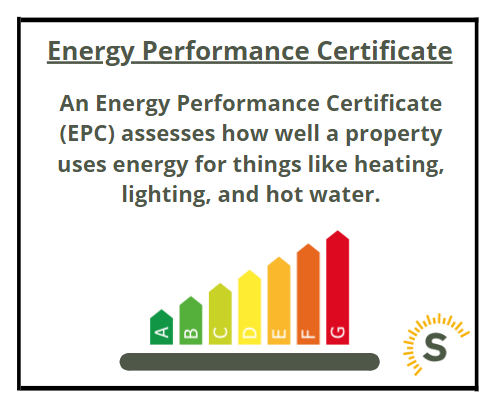An Energy Performance Certificate (EPC) is a document that provides vital information about a property's energy efficiency. This guide aims to provide an in-depth understanding of the EPC, its importance, costs involved, and how to obtain one.
An Energy Performance Certificate is a legal document that provides a detailed report of a building's energy efficiency. It offers potential buyers or tenants an insight into the property's energy costs and suggests measures to reduce energy consumption, thus improving the property's energy efficiency.
The EPC is regulated by the Energy Performance of Buildings Regulation 2012 and is conducted by accredited Domestic Energy Assessors. It is essential to note that as of 1st April 2018, new regulations require all eligible properties to meet a minimum standard of energy efficiency. Non-compliance may result in a penalty of up to £4,000.
To obtain an EPC, you have two options, first option is to check the EPC database through the Government. You may already have an existing EPC that can be used. If you do not, then you must contact a qualified and certificated Domestic Energy Assessor. Only accredited and DBS checked Domestic Energy Assessors are allowed to prepare Energy Performance Certificates.
If you head to the Government's find an EPC page, you can input your postcode and simply download an existing EPC. An EPC is valid for 10 years. This is your best option as it does not involve paying.
If you do not have the luxury of having an existing EPC, you can book an EPC online through a service such as EnergyPerformanceCertificates.co.uk. Energy Performance Certificates are the UK's largest EPC provider, rated excellent by TrustPilot. In some areas, EPC's are priced as little as £34 per assessment.
At this point, it's worth noting, that you may be offered an EPC through your estate agent. The costs of this will be almost three times as going privately, avoid these services unless they are fairly priced.

The EPC provides vital information about a property's energy costs, which is useful when considering the purchase or rental of a new property. The certificate offers an estimate of the current and potential energy bills of the property, enabling prospective buyers or tenants to compare properties and determine which would be cheaper to run.
For instance, the estimated cost of lighting, heating, and hot water over three years for a typical household may amount to £5,670. However, by improving energy efficiency, these costs could potentially reduce to £1,830, resulting in savings of nearly £4,000 over three years.
The EPC includes an energy efficiency rating ranging from A-G, with A being the most efficient. This rating is similar to the energy labels found on home appliances. The EPC also provides the potential rating that could be achieved by implementing suggested improvements.
For example, a home currently rated as F could potentially improve to a B rating by following recommended energy efficiency upgrades.
The EPC provides a detailed breakdown of the property's energy efficiency. It lists the estimated current and potential costs for heating, hot water, and lighting. Please note that these costs do not include additional energy costs from home appliances such as fridges or ovens.
The EPC also provides a visual comparison of the property's energy efficiency, similar to energy labels on home appliances. It further lists the potential savings that could be made by following recommended energy efficiency upgrades.
The cost of an EPC varies, ranging from £35.00-£120.00+VAT. There is no fixed cost, so it is recommended to compare prices from different providers. Factors such as the type of property, the number of bedrooms, and the property's location can affect the EPC cost.
The EPC provides a rating of the home's energy efficiency and environmental impact using a scale from A-G, with A rated homes being the most efficient. It provides suggestions on how to improve the rating, thereby reducing environmental impact and energy bills.
The certificate offers details about the property, including its location, age, size, and condition. These factors are considered to provide tailored energy-saving recommendations. The average UK property falls into the D or E band.
Yes. An EPC is required for buildings that are to be sold, rented, or built in England, Wales, and Northern Ireland. The EPC must be commissioned before the property is put on the market and must be available to be shown to prospective buyers or tenants if requested. Failure to produce an EPC at the required time can result in a fine.
However, certain buildings do not require an EPC. These include places of worship, holiday accommodation, industrial sites, buildings intended for demolition, buildings intended for use for less than 2 years, stand-alone buildings with less than 50 square metres of useful floor space, and listed buildings.
In conclusion, the Energy Performance Certificate (EPC) is a critical document that offers a detailed insight into a property's energy efficiency. It provides potential buyers or tenants with vital information about the property's energy costs and suggests ways to reduce energy consumption, thereby saving money and improving the property's energy efficiency.
In this insight we cover the question "Can Universal Credit Check My Bank Account?"
Is it possible to release equity in your property to help finance your retirement? We answer the question.
A guide to Home Insurance legal cover and how it can be used to claim for disputes.
A guide to Pension transfers, how to arrange one, moving pensions abroad and seeking the correct advice for you
What is a Standard Variable Rate? (SVR) How to know when to switch or stay on it.
A guide to the 7 year gift rule in inheritance tax, what you would need to pay and how to minimise it.
How can Gift Inter Vivos Insurance be used to help with the Inheritance tax costs involved with Gifting?